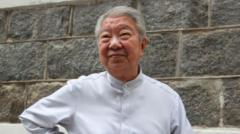The Hong Kong Journalists Association reveals that tax investigations have become another layer of distress for journalists, who already face self-censorship and fears of arrest under national security laws.
Press Freedom in Hong Kong Faces New Hurdle Amid Tax Investigations

Press Freedom in Hong Kong Faces New Hurdle Amid Tax Investigations
Journalists in Hong Kong report increased scrutiny and pressure from tax investigations, compounding their fears for press freedom as they navigate a repressive media environment.
Article Text:
Journalists in Hong Kong are under increasing pressure, as scrutiny from tax investigations has been added to the already heavy burdens of self-censorship and potential arrest since the implementation of national security laws five years ago. The Hong Kong Journalists Association reported an alarming trend this week, stating that it, along with six independent news outlets, are subjected to tax inquiries alongside their founders. This development underscores the growing threats to press freedom in the region.
The association noted that some investigations have extended to the personal taxes of the journalists' spouses or parents, an unprecedented level of scrutiny that amplifies their sense of vulnerability. Numerous journalists have been issued with additional tax demands and have been asked to provide financial documentation spanning up to seven years.
Selina Cheng, the association’s chair, voiced concerns over the lack of substantial evidence backing these tax investigations, arguing that the authorities often overlook business expenses and miscalculate income. "Journalists in Hong Kong do not enjoy significant salaries. In addition to addressing these tax claims, they must also expend considerable resources to prove their innocence," Cheng remarked.
Despite the overall number of tax investigations in Hong Kong being relatively modest, with around 1,800 audits completed by the Inland Revenue Department between 2023 and 2024, this wave of inquiries suggests a targeted approach against media professionals. The department maintains that these investigations are routine, asserting that the professional background of a taxpayer does not influence review procedures.
As the situation unfolds, the implications for press freedom and the future of journalism in Hong Kong remain dire, as journalists strive to navigate an environment increasingly hostile to dissenting voices.
Journalists in Hong Kong are under increasing pressure, as scrutiny from tax investigations has been added to the already heavy burdens of self-censorship and potential arrest since the implementation of national security laws five years ago. The Hong Kong Journalists Association reported an alarming trend this week, stating that it, along with six independent news outlets, are subjected to tax inquiries alongside their founders. This development underscores the growing threats to press freedom in the region.
The association noted that some investigations have extended to the personal taxes of the journalists' spouses or parents, an unprecedented level of scrutiny that amplifies their sense of vulnerability. Numerous journalists have been issued with additional tax demands and have been asked to provide financial documentation spanning up to seven years.
Selina Cheng, the association’s chair, voiced concerns over the lack of substantial evidence backing these tax investigations, arguing that the authorities often overlook business expenses and miscalculate income. "Journalists in Hong Kong do not enjoy significant salaries. In addition to addressing these tax claims, they must also expend considerable resources to prove their innocence," Cheng remarked.
Despite the overall number of tax investigations in Hong Kong being relatively modest, with around 1,800 audits completed by the Inland Revenue Department between 2023 and 2024, this wave of inquiries suggests a targeted approach against media professionals. The department maintains that these investigations are routine, asserting that the professional background of a taxpayer does not influence review procedures.
As the situation unfolds, the implications for press freedom and the future of journalism in Hong Kong remain dire, as journalists strive to navigate an environment increasingly hostile to dissenting voices.



















